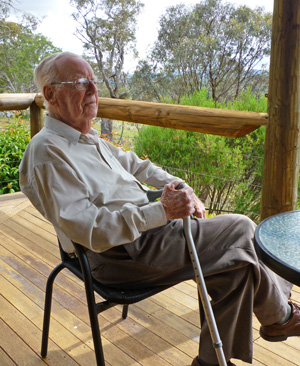
Professor Brian Kennett FAA FRS: 2017 Inge Lehmann Medal of the American Geophysical Union for outstanding contributions to the understanding of the structure, composition, and dynamics of the Earth’s mantle and core. This is the first time the award has gone to someone who has not held an academic position in the US and only the second time to be awarded outside the US.
Emeritus Professor John Pate FAA FRS: inducted into the Western Australian Science Hall of Fame, for greatly influencing plant science, particularly plant ecology and physiology, in Western Australia.
Professor Justin Gooding FAA: 2017 University of Technology Sydney Eureka Prize for Outstanding Mentor of Young Researchers.

1915 to 2017
Dr Max Day was a distinguished biologist, with an international reputation for his fundamental contributions to insect physiology. He later applied his work on insect hormones and insect digestion to a critical study of the mechanisms of transmission of animal and plant viruses by insects. Dr Day worked with Professor Frank Fenner AC FAA FRS on the myxoma virus, and was recognised as an extremely learned and productive biologist who championed entomology, conservation and forestry throughout his lifetime. Sir Gustav Nossal AC FAA FRS FTSE described Dr Day as ‘the driving force behind the Academy’s involvement in the environment’.
Dr Day was very actively involved in the Academy and served on and chaired Sectional Committees for Biological Sciences and Animal Sciences since the early 1960s until the mid-1990s, the Fenner Conferences on the Environment during the 1970s and 1980s, the Boden Research Conferences during the 1980s and numerous other committees and funds over several decades. He was also a member and Chair of the Editorial Board of the Records of the Academy, the Basser Library and the Publications committee on several occasions over many decades.
Dr Day co-authored his final scientific paper on the Ogmograptis scribbly gum moth at the age of 96, and co-authored a 2017 paper on the history of Australia’s response to the environment. To celebrate his 100th birthday in 2015, the ABC’s Science Show, presented by Professor Robyn Williams AM FAA, featured Dr Day. In 2017, the Academy’s Max Day Environmental Science Fellowship Award was established and Dr Day attended the inaugural award presentation held during Science at the Shine Dome in May.
Elected in 1956, Dr Day was the Academy’s oldest and longest serving Fellow.

1922 to 2017
Professor Ken Cavill was elected to the Academy in 1969 and was distinguished for his research on the chemistry of natural products and the relationship between chemical constitution and biological activity. His contributions in the heterocyclic field include structural and synthetic studies on mould metabolites. Professor Cavill also published valuable contributions on organic processes, particularly on the mechanism of lead tetra-acetate reactions. He also worked on the chemistry of insect venoms, attractants and repellents, and isolated a series of novel monoterpenes from various species of ants, establishing their structural correlations by degradation and synthesis. He was one of the leading authorities in the expanding field of cyclopentanoid monoterpenes.
Professor Cavill served on several Academy committees, including Sectional Committee 3: Chemistry (1971-75 and 1981-85) which he Chaired from 1982-83, and Sectional Committee 8: Applied Sciences (1976-80). He also served on the Academy’s Council from 1972-75 as an Ordinary Member representing the Physical Sciences.
© 2025 Australian Academy of Science